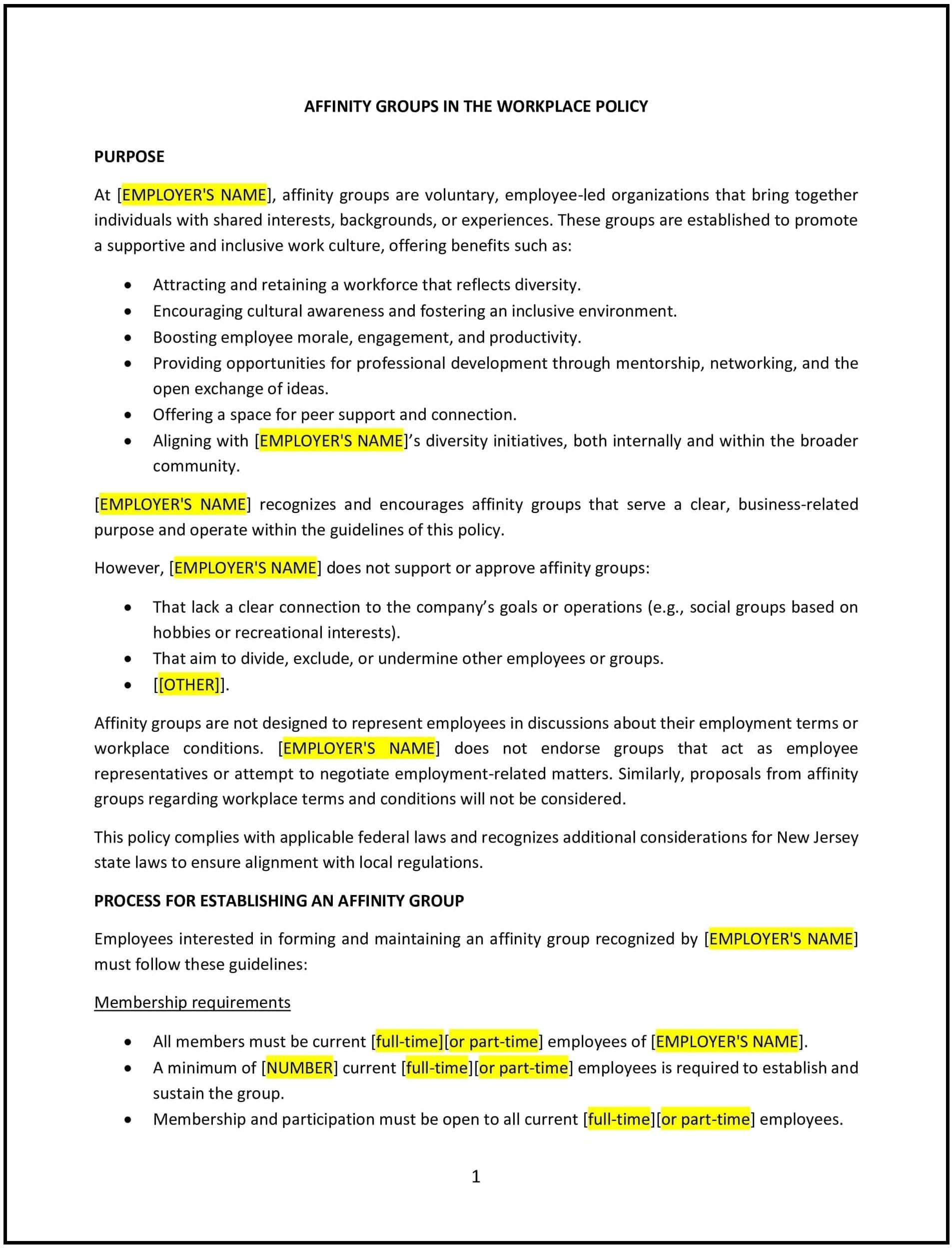Affinity groups in the workplace policy (New Jersey): Free template
Got contracts to review? While you're here for policies, let Cobrief make contract review effortless—start your free review now.

Customize this template for free
Affinity groups in the workplace policy (New Jersey)
An affinity groups in the workplace policy helps New Jersey businesses foster inclusivity, support diversity, and create a sense of belonging among employees. This policy provides a framework for establishing and managing employee-led affinity groups, which are voluntary, identity-based networks that promote connection, professional development, and cultural awareness. Tailored to New Jersey’s diverse population and values, this policy encourages businesses to create an environment where employees feel valued and supported.
By implementing this policy, businesses in New Jersey can enhance workplace culture, improve employee engagement, and demonstrate a commitment to diversity and inclusion.
How to use this affinity groups in the workplace policy (New Jersey)
- Define affinity groups: Clearly explain what affinity groups are and their purpose, such as fostering connection, promoting professional growth, and supporting diversity.
- Establish guidelines for forming groups: Outline the process for employees to propose and create affinity groups, including approval criteria and required documentation.
- Provide resources and support: Specify how businesses can support affinity groups, such as offering meeting spaces, budget allocations, or access to leadership.
- Encourage inclusivity: Emphasize that affinity groups should be open to all employees who share an interest in the group’s mission, regardless of their background.
- Promote collaboration: Encourage affinity groups to collaborate with each other and with leadership to align their activities with business goals.
- Set expectations for conduct: Establish guidelines for respectful and inclusive behavior within affinity groups to maintain a positive workplace environment.
- Communicate the policy: Share the policy with employees during onboarding and through internal communications to ensure awareness and understanding.
- Monitor and evaluate groups: Regularly assess the impact of affinity groups and gather feedback to improve their effectiveness.
- Review and update the policy: Periodically revise the policy to reflect changes in workplace dynamics, employee needs, or legal requirements.
Benefits of using this affinity groups in the workplace policy (New Jersey)
This policy offers several advantages for New Jersey businesses:
- Promotes inclusivity: Affinity groups create a sense of belonging and support for employees from diverse backgrounds.
- Enhances workplace culture: By fostering connection and collaboration, affinity groups contribute to a positive and engaging work environment.
- Supports professional development: Affinity groups provide opportunities for mentorship, skill-building, and career growth.
- Encourages diversity: These groups help businesses celebrate and leverage the unique perspectives and experiences of their workforce.
- Improves employee retention: A supportive and inclusive workplace can increase employee satisfaction and reduce turnover.
- Aligns with New Jersey values: The policy reflects the state’s emphasis on community, cultural diversity, and mutual respect.
- Strengthens employer branding: Demonstrating a commitment to diversity and inclusion can enhance the business’s reputation and attract top talent.
Tips for using this affinity groups in the workplace policy (New Jersey)
- Communicate the policy effectively: Share the policy with employees during onboarding and through regular reminders, such as emails or training sessions.
- Provide training: Educate employees and managers on the purpose and benefits of affinity groups and how to participate respectfully.
- Offer resources: Allocate budget, meeting spaces, or other resources to support the activities of affinity groups.
- Encourage leadership involvement: Involve senior leaders in affinity group initiatives to demonstrate organizational support.
- Measure impact: Track the success of affinity groups through employee feedback, participation rates, and alignment with business goals.
- Celebrate achievements: Recognize the contributions of affinity groups through internal communications or events.
- Review the policy periodically: Update the policy as needed to reflect changes in workplace dynamics, employee needs, or legal requirements.